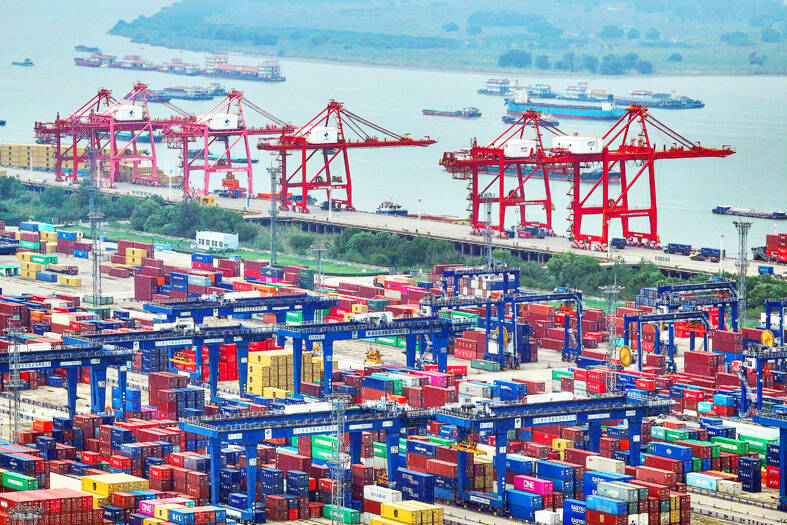China hopes to rebuild its supply chain by wooing Taiwanese businesses at this year’s Cross-Strait CEO Summit (CSCS) to be held today in the Chinese city of Xiamen, a source said yesterday.
This year’s summit would focus on “building a cross-strait industrial chain in the new era and promoting cross-strait economic integration and development,” promotional materials for the event said.
The aim is to encourage Taiwanese businesspeople who have exited the Chinese market to return and invest there as a means of countering various technology export controls that China has been encountering, the source said.

Photo: AFP
Former premier Liu Chao-shiuan (劉兆玄) and former Beijing mayor Guo Jinlong (郭金龍), the summit’s co-chairs, are expected to deliver speeches at the event’s opening ceremony.
Chinese Communist Party (CCP) Politburo Standing Committee member Wang Huning (王滬寧) attended the event last year, during which he read a letter from Chinese President Xi Jinping (習近平) and delivered a speech. However, it has not been determined whether he would attend this year, the source said.
Other Taiwanese attendees include former vice-premier Woody Duh (杜紫軍) and former minister of economic affairs Yiin Chii-ming (尹啟銘), both Chinese Nationalist Party (KMT) members, as well as former KMT vice chairman Steve Chan (詹啟賢).
However, Third Wednesday Club (三三會) chairman Lin Por-fong (林伯豐), who is known to be close to Beijing, pulled out of the event at the last minute saying he had “something else” to take care of, sending the organization’s secretary-general in his place.
Some Taiwanese industry leaders had not initially planned to attend, but later agreed to do so after Beijing threatened that they should “carefully consider the consequences of non-attendance,” the source said.
“They were worried that investments and company offices in China might be put under pressure, and in the end, they had no choice but to attend the summit in a low-key manner,” the source said.
Beijing has also recently used “soft and hard tactics” to pressure Taiwanese businesspeople not to withdraw from China, the source said.
“At the same time, Taiwanese businesspeople are being invited, through contacts in China and Taiwan, to participate in investment events in Xinjiang Province, Tibet and other places,” they said.
Citing an example, the source said that a former Mainland Affairs Council official who is a member of the KMT had been scheduled to lead a delegation of Taiwanese investors to Xinjiang in September, but the plan was canceled after it was exposed by the media in Taiwan.
The government has warned Taiwanese technology investors who enter the Chinese market that doing so could impact their future prospects.
This is particularly the case for investors who are found to be an accomplice of Russia’s invasion of Ukraine, which China has been found to be supporting through trade, the source said.

SECURITY: As China is ‘reshaping’ Hong Kong’s population, Taiwan must raise the eligibility threshold for applications from Hong Kongers, Chiu Chui-cheng said When Hong Kong and Macau citizens apply for residency in Taiwan, it would be under a new category that includes a “national security observation period,” Mainland Affairs Council (MAC) Minister Chiu Chui-cheng (邱垂正) said yesterday. President William Lai (賴清德) on March 13 announced 17 strategies to counter China’s aggression toward Taiwan, including incorporating national security considerations into the review process for residency applications from Hong Kong and Macau citizens. The situation in Hong Kong is constantly changing, Chiu said to media yesterday on the sidelines of the Taipei Technology Run hosted by the Taipei Neihu Technology Park Development Association. With

CARROT AND STICK: While unrelenting in its military threats, China attracted nearly 40,000 Taiwanese to over 400 business events last year Nearly 40,000 Taiwanese last year joined industry events in China, such as conferences and trade fairs, supported by the Chinese government, a study showed yesterday, as Beijing ramps up a charm offensive toward Taipei alongside military pressure. China has long taken a carrot-and-stick approach to Taiwan, threatening it with the prospect of military action while reaching out to those it believes are amenable to Beijing’s point of view. Taiwanese security officials are wary of what they see as Beijing’s influence campaigns to sway public opinion after Taipei and Beijing gradually resumed travel links halted by the COVID-19 pandemic, but the scale of

A US Marine Corps regiment equipped with Naval Strike Missiles (NSM) is set to participate in the upcoming Balikatan 25 exercise in the Luzon Strait, marking the system’s first-ever deployment in the Philippines. US and Philippine officials have separately confirmed that the Navy Marine Expeditionary Ship Interdiction System (NMESIS) — the mobile launch platform for the Naval Strike Missile — would take part in the joint exercise. The missiles are being deployed to “a strategic first island chain chokepoint” in the waters between Taiwan proper and the Philippines, US-based Naval News reported. “The Luzon Strait and Bashi Channel represent a critical access

Pope Francis is be laid to rest on Saturday after lying in state for three days in St Peter’s Basilica, where the faithful are expected to flock to pay their respects to history’s first Latin American pontiff. The cardinals met yesterday in the Vatican’s synod hall to chart the next steps before a conclave begins to choose Francis’ successor, as condolences poured in from around the world. According to current norms, the conclave must begin between May 5 and 10. The cardinals set the funeral for Saturday at 10am in St Peter’s Square, to be celebrated by the dean of the College